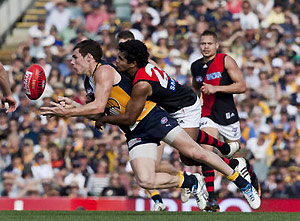
Luke Shuey for the Eagles is tackled by Alwyn Davey. AAP Image/Tony McDonough
Later today, a young AFL player, most likely Essendon’s Dyson Heppell or West Coast’s Luke Shuey, will be crowned the Rising Star for 2011. However, in recent years, it’s become clear the award has an unjust flaw. And until this fault is addressed and changed, the prestigious accolade will continue to be marred.
Don’t be mistaken – the concept of the award is a necessity for the AFL.
The Rising Star has become one of the most respected prizes in the league. A number of accomplished players, such as Nathan Buckley, Ben Cousins, Nick Riewoldt, Adam Goodes, Sam Mitchell and Joel Selwood, have all won it in the past.
For the past 20 years, the league has rewarded, encouraged and celebrated its elite youth. And it must continue to do that.
But the award’s terms and conditions need to be attended to. How Heppell – a 19-year-old in his first season – and Shuey – a 21-year-old in his third season – can be put in the same category is perplexing.
The criteria is puzzling and, in turn, unfair. For those who aren’t aware of how the system works, here’s a brief summary of how young players are nominated each week:
– At the conclusion of every round during the AFL home-and-away season, a standout young player is nominated for the Rising Star award.
– To be eligible to receive a nomination, a player must: be under the age of 21 on January 1 of that year, have played 10 or fewer senior games before Round 1 and not have been suspended during the season.
– At the end of the season, nine AFL personalities vote for five of the 22 nominees, with their top selections earning five votes. The player who receives the most votes is the winner.
Under those conditions, first-year players are immediately disadvantaged. A player who has been on a list for two or three years has an equal chance of winning as a player in their debut season.
Shuey’s currently in his third AFL season, meaning he’d already had two full pre-seasons with the Eagles before the first round.
Unlike Heppell, Shuey was prepared for both the physical and mental demands of AFL footy this season. He’d already been training with and learning off the likes of Daniel Kerr, Matt Priddis and Adam Selwood. As AFL pundit Gerard Healy put it on the Fox Sports website recently, Shuey had already learned ‘the set-ups, structures and expectations of the game at the highest level’.
It seems silly when a player of Shuey’s age and maturity is grouped with Heppell – or any first-year player.
Before 2011, Heppell, and all other first-year players, hadn’t been exposed to the nuances of AFL footy. Unlike Shuey, they hadn’t been training with and learning off AFL players in previous years. Instead they had trained with and played against kids the same age as them. They were fresh, raw and unsure of what to expect.
Yes it’s all well and good to be more inclusive to late starters. But the real young ones are up against it. And that’s not fair.
So what’s the solution? How do we equalise the prize?
Turn the ‘Rising Star’ into an award that exclusively recognises the best first-year player under 21.
Yes the talent pool will be narrowed. Yes young players in their second or third years, who might have suffered injuries or played just one game in their first year on an AFL list, will miss out on recognition.
Tough luck.
Balancing the award should take higher precedence than players in their second or third year who failed to make an impact first up.
And it’s not like the judges would have no talent to choose from.
If you applied the new system to this season’s class of young first-year players, the panel would have an array of impressive talent to choose from.
Heppell would be the obvious standout. But there would be solid competition from other Rising Star nominees in Zac Smith, David Swallow, Trent McKenzie, Jack Darling, Andrew Gaff, Alex Fasolo, Luke Dahlhaus and Jake Batchelor. And if you were to remove the older weekly nominees from this season, the likes of Tom Liberatore, Patrick Karnezis, Jack Gunston and Alex Johnson would only add more talent to the group.
This is far from a campaign against Shuey. He’s a class player and, under the current criteria and process, fully deserves to win the award today. He’s influenced more games and accumulated more goals, kicks, contested possessions, clearances, tackles, goal assists and inside 50’s than Heppell this season.
But due to age and maturity, there’s no doubt Shuey will have a distinct and inequitable advantage over Heppell when the judges vote later today. And that can’t continue.





























































































